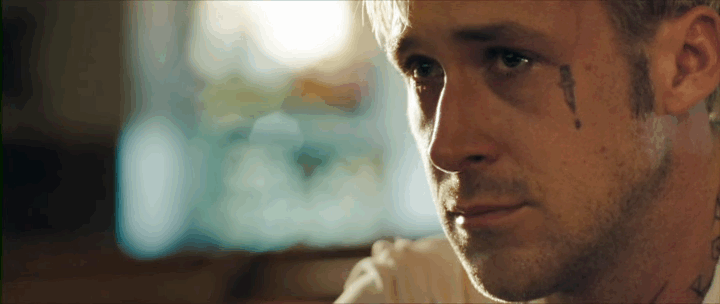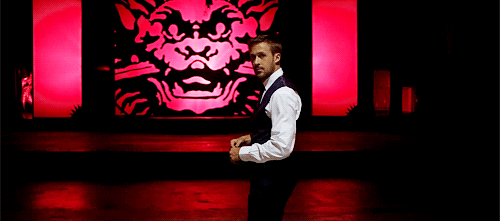Ode to the Tough Guy: Ryan Gosling and Masculinity

By Ivana Brehas
Ryan Gosling is a versatile actor, but placing three of his roles (Drive, The Place Beyond the Pines and Only God Forgives) side-by-side reveals an interesting through-line in his career: all three films examine how behaviour can be shaped by our ideas of masculinity.
When Drive – which screens at this year’s MIFF special event Hear My Eyes – was released in 2011, it had the divisive effect on critics that we have now come to expect from a Nicolas Winding Refn picture. Some, like writer Katerina Korola, argued that Drive uncritically presented us with “an outmoded model of chivalric masculinity”. Korola’s arguments are compelling, but I believe that the film is more aware of its depictions of gender than she suggests. The Driver (Gosling) plays the archetypal masculine ‘hero’ to the point of absurdity. When discussing his role in Drive, Gosling has described his character as “a guy that’s seen too many movies” and become “lost in the mythology of Hollywood”. It’s easy to see how the Driver’s behavior might have been inspired by Hollywood’s hypermasculine heroes, his delusions of knighthood echoing figures like Taxi Driver’s Travis Bickle. There is one key moment in Drive that indicates the film’s critical stance on its hero – the iconic elevator scene
As Scott Patterson writes, “the famous elevator scene sees the hero become the villain for long enough to utterly shatter any hope of redemption or release”. The scene follows a pattern audiences have seen many times before – a male hero violently defending a woman from a ‘bad guy’ – only here, the violence is so brutal that it repulses us. The scene loses its romance, exposing the deranged ideology behind the masculine model of heroism through violence. Gosling’s Driver does not just stop the ‘bad guy’, he kicks his face in, while we watch with increasing discomfort. The Driver is oblivious to the horror of his actions, convinced that this is how heroes are supposed to act. But when he turns to his ‘damsel in distress’, Iris (Carey Mulligan), she is not charmed or grateful: she is horrified.

The following year, Gosling presented another version of this archetype in The Place Beyond the Pines. Luke Glanton is arguably more empathetic than the Driver, but even he is not immune to the power of masculine mythology. Men have historically been viewed as the ‘providers’ in Western cultures, and Luke is driven by a misguided urge to fulfil this role through violent and dangerous behavior. Despite the protests of Romina (Eva Mendes), the mother of his child, Luke goes to extreme lengths to demonstrate his love, ignoring the paradox that this recklessness causes his loved ones distress. Only moments before his death does he realise the error of his ways, asking Romina not to tell their son Jason about him. This examination of masculinity is echoed later in the film when Jason (Dane DeHaan) becomes entranced by the mythic idea of an “outlaw” father. Kofi (Mahershala Ali), a more well-adjusted figure, probes: “That sound cool to you?”

Just as Gosling’s breakout performances of amplified masculinity were becoming imprinted in our cultural memory, he reunited with Refn to destroy this persona with 2013’s Only God Forgives. There is a continuity, an evolution between this film and Drive. As Gosling notes, Refn is trying to “emasculate and castrate” the “clichéd action hero” that Gosling had previously embodied. Calling back the action-movie tropes around which the Driver built his life, Only God Forgives’ Julian is similarly silent, similarly unhinged, but not nearly as commanding or capable. He never successfully fights anyone, and interprets his incompetence in battle as a failure of his masculinity. The film is unabashedly Freudian, full of troubling mother-son relationships and castration anxiety. Julian’s violence is a result of this insecurity, borne out of a worrying inability to express himself through any other means. Unable to properly connect to the women in his life, Julian lashes out through violent tantrums. The expectations placed on men to express themselves through violence are shown to have stunted his emotional wellbeing.

Ryan Gosling’s roles in Drive, The Place Beyond the Pines and Only God Forgives differ in many ways. But there is something they all reveal: men suffer, and cause suffering, when trying to fulfil unrealistic ideas of masculinity. Real human beings are not heroes.
Ivana Brehas is a writer, video essayist, and a participant in MIFF 2018 Critics Campus.